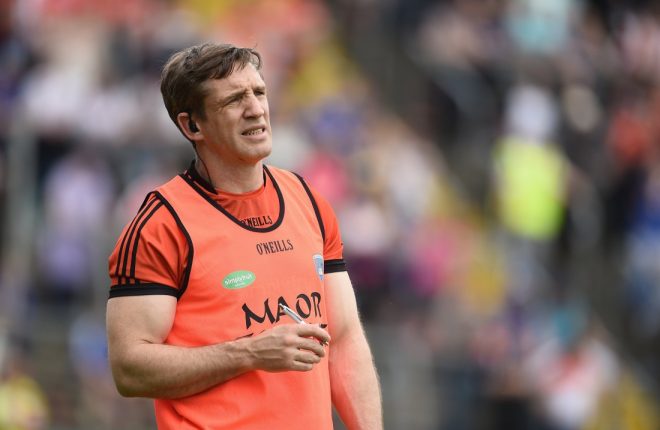
Armagh’s Kieran McGeeney
By John Hughes
I was interviewing a young athlete from a different sport last week. It was eye-opening stuff. Still in their mid-teens, they were telling me they train between 13 and 17 hours a week.
Try and get your head around that. If you sat down and watched television for that length of time each and every single week it would be hard work. You’d go crazy doing that week in, week out, never mind bursting yourself to be the very best you could be in a highly competitive sporting discipline.
I’m 41 now and probably training more than I ever did in my entire life, but it still wouldn’t get past the four hour mark in any given week.
Even at that it’s no skin off my nose to devote a fair portion of time to swimming, running or biking. I’m an oul fart and my life is essentially over. There isn’t the range of alternative attractions out there for me that there is for someone in their teens or 20s.
Those golden people have lives to live, people to meet, dreams to dream. Handing over a huge slice of your time to the energy sapping grind of hard hard training at a stage of life when most of your contemporaries are curting, drinking and otherwise making merry seems like a rather brave gamble with your happiness in the here and now. Yet many committed young people do it, and for the acknowledged prospect of little reward or recognition.
It takes us back to Kieran McGeeney’s recent comments on the matter.
“I still can’t see where GAA players train that hard,” said the Armagh manager. “We don’t train hard despite what people may say – any other sport trains much harder. They’re all amateurs in this country. You train on Tuesdays and Thursdays and you have gym sessions and if you have a game [then you play it]. Most people who have any keep-fit regime do that.”
As can been seen from the example at the start of this piece, there are any number of examples of young determined people who train a lot harder and for the prospect of much less reward than GAA players. And McGeeney’s comments show us that there are people in the GAA who recognise that too.
That raises some interesting questions about some of the accepted truths of the GAA.
How real is burn-out? Sure, there’s a period where players can be pulled in all directions. But in the worst week, would a young GAA player really pile up 13 hours of hard physical slog on the pitch and the gym?
The person I interviewed was slight, but you could almost sense their inner determination. There was no carping about the time that had to be spent training, just an acceptance that was the price of success in a sport they had decided to give their best shot.
That makes me question if burn out is really the right name for this phenomenon where players move away from our games between their teens and early 20s. The young body can take a hell of a lot of physical punishment. It seems to me that perhaps this is more of a state of mind, a weariness with the opportunity cost involved in playing GAA at the top level while your peers are footloose and fancy free.
If it turns out the reasons behind burn out are mainly mental and societal, then it does it make sense to address that purely with remedies which focus on just the physical symptoms?
I don’t know for sure, but I do think the real causes underlying what we call burn out merit further serious examination if we really want to stop it.
Receive quality journalism wherever you are, on any device. Keep up to date from the comfort of your own home with a digital subscription.
Any time | Any place | Anywhere











